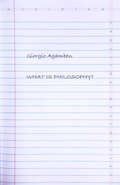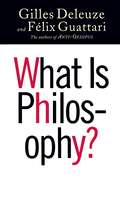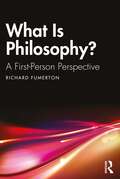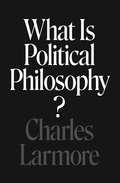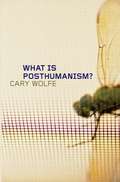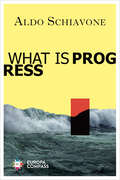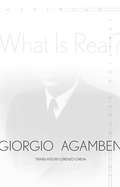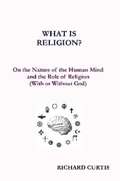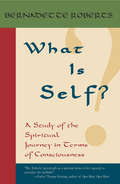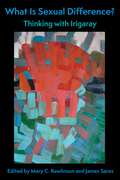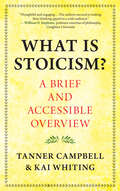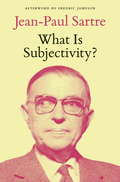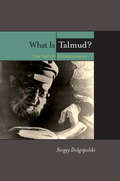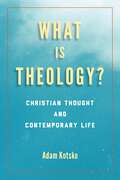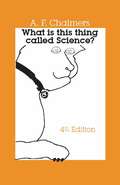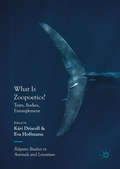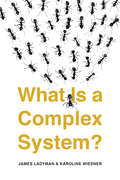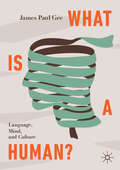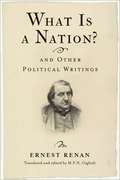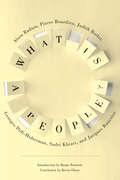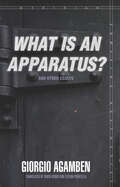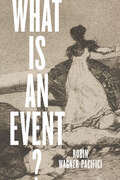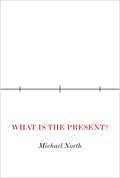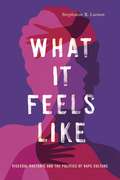- Table View
- List View
What Is Philosophy?
by Gilles Deleuze Félix Guattari Hugh Tomlinson Graham BurchellCalled by many France's foremost philosopher, Gilles Deleuze is one of the leading thinkers in the Western World. His acclaimed works and celebrated collaborations with Félix Guattari have established him as a seminal figure in the fields of literary criticism and philosophy. The long-awaited publication of What Is Philosophy? in English marks the culmination of Deleuze's career. Deleuze and Guattari differentiate between philosophy, science, and the arts, seeing as means of confronting chaos, and challenge the common view that philosophy is an extension of logic. The authors also discuss the similarities and distinctions between creative and philosophical writing. Fresh anecdotes from the history of philosophy illuminate the book, along with engaging discussions of composers, painters, writers, and architects. A milestone in Deleuze's collaboration with Guattari, What Is Philosophy? brings a new perspective to Deleuze's studies of cinema, painting, and music, while setting a brilliant capstone upon his work.
What Is Philosophy?
by Giorgio Agamben Lorenzo ChiesaIn attempting to answer the question posed by this book's title, Giorgio Agamben does not address the idea of philosophy itself. Rather, he turns to the apparently most insignificant of its components: the phonemes, letters, syllables, and words that come together to make up the phrases and ideas of philosophical discourse. A summa, of sorts, of Agamben's thought, the book consists of five essays on five emblematic topics: the Voice, the Sayable, the Demand, the Proem, and the Muse. In keeping with the author's trademark methodology, each essay weaves together archaeological and theoretical investigations: to a patient reconstruction of how the concept of language was invented there corresponds an attempt to restore thought to its place within the voice; to an unusual interpretation of the Platonic Idea corresponds a lucid analysis of the relationship between philosophy and science, and of the crisis that both are undergoing today. In the end, there is no universal answer to what is an impossible or inexhaustible question, and philosophical writing—a problem Agamben has never ceased to grapple with—assumes the form of a prelude to a work that must remain unwritten.
What Is Philosophy? (European Perspectives: A Series in Social Thought and Cultural Criticism)
by Gilles Deleuze Félix GuattariCalled by many France's foremost philosopher, Gilles Deleuze is one of the leading thinkers in the Western World. His acclaimed works and celebrated collaborations with Félix Guattari have established him as a seminal figure in the fields of literary criticism and philosophy. The long-awaited publication of What Is Philosophy? in English marks the culmination of Deleuze's career.Deleuze and Guattari differentiate between philosophy, science, and the arts, seeing as means of confronting chaos, and challenge the common view that philosophy is an extension of logic. The authors also discuss the similarities and distinctions between creative and philosophical writing. Fresh anecdotes from the history of philosophy illuminate the book, along with engaging discussions of composers, painters, writers, and architects.A milestone in Deleuze's collaboration with Guattari, What Is Philosophy? brings a new perspective to Deleuze's studies of cinema, painting, and music, while setting a brilliant capstone upon his work.
What Is Philosophy?: A First-Person Perspective
by Richard FumertonAs philosophy departments attempt to define their unique value amid program closures in the humanities and the rise of interdisciplinary research, metaphilosophy has become an increasingly important area of inquiry. Richard Fumerton here lays out a cogent answer to the question asked in the book’s title, What Is Philosophy?. Against those who argue that philosophy is not sharply distinguishable from the sciences, Fumerton makes a case for philosophy as an autonomous discipline with its own distinct methodology. Over the course of nine engaging and accessible chapters, he shows that answering fundamental philosophical questions requires one to take a radical first-person perspective that divorces the truth conditions of philosophical claims from the kind of contingent truths investigated by the empirical sciences. Along the way, Fumerton briefly discusses the historical controversies that have surrounded the nature of philosophy, situating his own argument within the larger conversation. Key Features Illuminates the unique role of thought experiments and especially the "paradox of analysis" in understanding the purpose and value of philosophy Shows that philosophy asks fundamental questions, unanswerable by the sciences, that are critical to thinking clearly and rationally about the world Highlights the distinct character of philosophical questions in specific subject areas: philosophy of language, epistemology, ethics, philosophy of mind, and philosophy of science Concludes by making a unique case for philosophy’s contribution to cross-disciplinary work in ethics, politics, mathematics, and the empirical sciences Written in a way to be engaging and accessible for advanced undergraduate readers
What Is Political Philosophy?
by Charles LarmoreA new understanding of political philosophy from one of its leading thinkersWhat is political philosophy? What are its fundamental problems? And how should it be distinguished from moral philosophy? In this book, Charles Larmore redefines the distinctive aims of political philosophy, reformulating in this light the basis of a liberal understanding of politics.Because political life is characterized by deep and enduring conflict between rival interests and differing moral ideals, the core problems of political philosophy are the regulation of conflict and the conditions under which the members of society may thus be made subject to political authority. We cannot assume that reason will lead to unanimity about these matters because individuals hold different moral convictions. Larmore therefore analyzes the concept of reasonable disagreement and investigates the ways we can adjudicate conflicts among people who reasonably disagree about the nature of the human good and the proper basis of political society. Challenging both the classical liberalism of Locke, Kant, and Mill, and more recent theories of political realism proposed by Bernard Williams and others, Larmore argues for a version of political liberalism that is centered on political legitimacy rather than on social justice, and that aims to be well suited to our times rather than universally valid.Forceful and thorough yet concise, What Is Political Philosophy? proposes a new definition of political philosophy and demonstrates the profound implications of that definition. The result is a compelling and distinctive intervention from a major political philosopher.
What Is Posthumanism? (Posthumanities #8)
by Cary WolfeWhat does it mean to think beyond humanism? Is it possible to craft a mode of philosophy, ethics, and interpretation that rejects the classic humanist divisions of self and other, mind and body, society and nature, human and animal, organic and technological? Can a new kind of humanities—posthumanities—respond to the redefinition of humanity&’s place in the world by both the technological and the biological or &“green&” continuum in which the &“human&” is but one life form among many?Exploring how both critical thought along with cultural practice have reacted to this radical repositioning, Cary Wolfe—one of the founding figures in the field of animal studies and posthumanist theory—ranges across bioethics, cognitive science, animal ethics, gender, and disability to develop a theoretical and philosophical approach responsive to our changing understanding of ourselves and our world. Then, in performing posthumanist readings of such diverse works as Temple Grandin&’s writings, Wallace Stevens&’s poetry, Lars von Trier&’s Dancer in the Dark, the architecture of Diller+Scofidio, and David Byrne and Brian Eno&’s My Life in the Bush of Ghosts, he shows how this philosophical sensibility can transform art and culture. For Wolfe, a vibrant, rigorous posthumanism is vital for addressing questions of ethics and justice, language and trans-species communication, social systems and their inclusions and exclusions, and the intellectual aspirations of interdisciplinarity. In What Is Posthumanism? he carefully distinguishes posthumanism from transhumanism (the biotechnological enhancement of human beings) and narrow definitions of the posthuman as the hoped-for transcendence of materiality. In doing so, Wolfe reveals that it is humanism, not the human in all its embodied and prosthetic complexity, that is left behind in posthumanist thought.
What Is Progress
by Aldo Schiavone“Historian Schiavone mixes philosophy, politics, and anthropology in this stimulating inquiry into the ‘paradigm of progress.’” —Publishers WeeklyToday, many believe that progress is a word to be avoided, a relic from a past, the dangerous product of an era of intellectual naivety that would be best forgotten. Yet, the idea of progress is rooted in a human impulse that is both profound and essential, a way of interpreting history without which our ability to plan the future—and our very identity—would be at stake.Written just before the onset of the Coronavirus pandemic—which is now putting its argument to the hardest of tests—this lucid essay explores how science and technology have been, and can still be, a powerful engine for human advancement.
What Is Real? (Meridian: Crossing Aesthetics)
by Giorgio Agamben Lorenzo ChiesaEighty years ago, Ettore Majorana, a brilliant student of Enrico Fermi, disappeared under mysterious circumstances while going by ship from Palermo to Naples. How is it possible that the most talented physicist of his generation vanished without leaving a trace? It has long been speculated that Majorana decided to abandon physics, disappearing because he had precociously realized that nuclear fission would inevitably lead to the atomic bomb. This book advances a different hypothesis. Through a careful analysis of Majorana's article "The Value of Statistical Laws in Physics and Social Sciences," which shows how in quantum physics reality is dissolved into probability, and in dialogue with Simone Weil's considerations on the topic, Giorgio Agamben suggests that, by disappearing into thin air, Majorana turned his very person into an exemplary cipher of the status of the real in our probabilistic universe. In so doing, the physicist posed a question to science that is still awaiting an answer: What is Real?
What Is Religion?
by Richard CurtisIn this book Richard Curtis argues that religion is a universal human phenomenon regardless of content. In popular culture religion is understood to be belief in supernatural things but specialists in the field usually use a generic definition. Dr. Curtis, here, offers his theory of the nature of religion, which is open as to content (that is compatible with theistic and atheistic positions), based on the latest insights from Philosophy of Mind, the Social Sciences and the Cognitive Sciences.
What Is Self?: A Study of the Spiritual Journey in Terms of Consciousness
by Bernadette RobertsThe renowned contemporary mystic and author of The Experience of No-Self presents her philosophical treatise on the nature of Self and God. As a Carmelite nun, Bernadette Roberts pursued a life in union with God. She wrote compellingly about her contemplative spiritual journey in her memoirs The Experience of No-Self and The Path of No-Self. Now she builds on the wisdom she gained, exploring the ultimate consciousness that transcends self and experience. In What Is Self?, Ms. Roberts explains her conceptions of the ego, the self, and the revelations of the contemplative life. Deeply personal and profoundly spiritual, this latest effort puts all of Bernadette&’s insights into clearer and sharper perspective—as though her own journey has grown clearer with distance.
What Is Sexual Difference?: Thinking with Irigaray
by Mary C. Rawlinson and James SaresLuce Irigaray has written that “sexual difference is one of the major philosophical issues, if not the issue, of our age.” Spanning metaphysics, phenomenology, and psychoanalysis, her work examines how sexual difference structures being and subjectivity, organizes our experience of the world, and affects the images and discourses involved in knowledge production and practical action. No other philosopher has paid such careful attention to the consequences of the elision of sexual difference in philosophical thought. However, at a time when notions of sexual and gender difference are hotly contested, Irigaray’s thought has often been dismissed as essentialist or reductively binary.This book brings together leading scholars to consider the philosophical implications of Irigaray’s writing on sexual difference, particularly for issues of gender and race. Their essays directly confront the charge of essentialism, exploring how Irigaray’s thought opens new possibilities for understanding the complexity of gender identities, including nonbinary and trans experiences as well as alternative configurations of masculinity and femininity. Though Irigaray is sometimes accused of a failure to appreciate racial difference, contributors show the productive role of her work in thinking race. This book also illuminates how Irigaray’s work provides creative practices that help realign human experience and our relations with nature and each other.
What Is Stoicism?: A Brief and Accessible Overview
by Kai Whiting Tanner CampbellAn easy, jargon-free introduction to stoicism that covers the full range of stoic thought in a single compact volume Divided into short chapters that can be read in brief sittings, What Is Stoicism? compiles two millennia of Stoic thought into simple conversational prose. This whistle-stop tour of Stoicism covers a surprising number of core topics: • the three pillars of Stoic philosophy: logic, physics, and ethics • the ultimate goal of Stoicism: virtue • the Stoic concept of circles of concern: our individual obligations to our family, community, and world • the Stoic ideal of living in accordance with nature Readers will come to appreciate the vitality of Stoicism and realize how the wisdom of the past can meet the challenges of the present and the future.
What Is Subjectivity?
by Jean-Paul SartreJean-Paul Sartre, at the height of his powers, debates with Italy's leading intellectualsIn 1961, the prolific French intellectual Jean-Paul Sartre was invited to give a talk at the Gramsci Institute in Rome. In attendance were some of Italy's leading Marxist thinkers, such as Enzo Paci, Cesare Luporini, and Galvano Della Volpe, whose contributions to the long and remarkable discussion that followed are collected in this volume, along with the lecture itself. Sartre posed the question "What is subjectivity?"--a question of renewed importance today to contemporary debates concerning "the subject" in critical theory. This work includes a preface by Michel Kail and Raoul Kirchmayr and an afterword by Fredric Jameson, who makes a rousing case for the continued importance of Sartre's philosophy.From the Trade Paperback edition.
What Is Talmud?: The Art of Disagreement
by Sergey DolgopolskiTrue disagreements are hard to achieve, and even harder to maintain, for the ghost of final agreement constantly haunts them. The Babylonian Talmud, however, escapes from that ghost of agreement, and provokes unsettling questions: Are there any conditions under which disagreement might constitute a genuine relationship between minds? Are disagreements always only temporary steps toward final agreement? Must a community of disagreement always imply agreement, as in an agreement to disagree? What is Talmud? rethinks the task of philological, literary, historical, and cultural analysis of the Talmud. It introduces an aspect of this task that has best been approximated by the philosophical, anthropological, and ontological interrogation of human being in relationship to the Other-whether animal, divine, or human. In both engagement and disengagement with post-Heideggerian traditions of thought, Sergey Dogopolski complements philological-historical and cultural approaches to the Talmud with a rigorous anthropological, ontological, and Talmudic inquiry. He redefines the place of the Talmud and its study, both traditional and academic, in the intellectual map of the West, arguing that Talmud is a scholarly art of its own and represents a fundamental intellectual discipline, not a mere application of logical, grammatical, or even rhetorical arts for the purpose of textual hermeneutics. In Talmudic intellectual art, disagreement is a fundamental category. What Is Talmud? rediscovers disagreement as the ultimate condition of finite human existence or co-existence.
What Is Theology?: Christian Thought and Contemporary Life (Perspectives in Continental Philosophy)
by Adam KotskoThe secular world may have thought it was done with theology, but theology was not done with it. Recent decades have seen a resurgence of religion on the social and political scene, which have driven thinkers across many disciplines to grapple with the Christian theological inheritance of the modern world. Adam Kotsko provides a unique guide to this fraught terrain. The title essay establishes a fresh and unexpected redefinition of theology and its complex and often polemical relationship with its sister discipline of philosophy. Subsequent essays build on this framework from three different perspectives. In the first part, Kotsko demonstrates the continued vibrancy of Christian theology as a creative and constructive pursuit outside the walls of the church, showing that theological concepts can underwrite a powerful critique of the modern world. The second approaches Christian theology from the perspective of a range of contemporary philosophers, showing how philosophical thought is drawn to theology even despite itself. The concluding section is devoted to the unexpected theological roots of the modern world-system, making a case that the interplay of state and economy and the structure of modern racial oppression both build on theological patterns of thought.Kotsko’s book ultimately shows that theology is not a scholarly game or an edifying spiritual discipline, but a world-shaping force of great power. Lives are at stake when we do theology—and if we don’t do it, someone else will.
What Is This Thing Called Science?
by Alan F. ChalmersCo-published with the University of Queensland Press. HPC holds rights in North America and U. S. Dependencies.Since its first publication in 1976, Alan Chalmers's highly regarded and widely read work--translated into eighteen languages--has become a classic introduction to the scientific method, known for its accessibility to beginners and its value as a resource for advanced students and scholars.In addition to overall improvements and updates inspired by Chalmers's experience as a teacher, comments from his readers, and recent developments in the field, this fourth edition features an extensive chapter-long postscript that draws on his research into the history of atomism to illustrate important themes in the philosophy of science. Identifying the qualitative difference between knowledge of atoms as it figures in contemporary science and metaphysical speculations about atoms common in philosophy since the time of Democritus offers a revealing and instructive way to address the question at the heart of this groundbreaking work: What is this thing called science?
What Is Zoopoetics?
by Kári Driscoll Eva HoffmannThis book brings together essays dealing with the question of zoopoetics both as an object of study—i.e. texts from various traditions and periods that reflect, explicitly or implicitly, on the relationship between animality, language and representation—and as a methodological problem for animal studies, and, indeed, for literary studies more generally. What can literary animal studies tell us about literature that conventional literary studies might be blind to? How can literary studies resist the tendency to press animals into symbolic service as metaphors and allegories for the human whilst also avoiding a naïve literalism with respect to the literary animal? The volume is divided into three sections: “Texts,” which focuses on the linguistic and metaphorical dimensions of zoopoetics; “Bodies,” which is primarily concerned with mimesis and questions of embodiment, performance, and lived experience; and “Entanglement,” which focuses on interspecies encounters and the complex interplay between word and world that emerges from them. The volume will appeal to scholars and students in the fields of animal studies, area studies and comparative literature, gender studies, environmental humanities, ecocriticism, and the broader field of posthumanism.
What Is a Complex System?
by James Ladyman Karoline WiesnerA clear, concise introduction to the quickly growing field of complexity science that explains its conceptual and mathematical foundations What is a complex system? Although &“complexity science&” is used to understand phenomena as diverse as the behavior of honeybees, the economic markets, the human brain, and the climate, there is no agreement about its foundations. In this introduction for students, academics, and general readers, philosopher of science James Ladyman and physicist Karoline Wiesner develop an account of complexity that brings the different concepts and mathematical measures applied to complex systems into a single framework. They introduce the different features of complex systems, discuss different conceptions of complexity, and develop their own account. They explain why complexity science is so important in today&’s world.
What Is a Human?: Language, Mind, and Culture
by James Paul GeeIn a sweeping synthesis of new research in a number of different disciplines, this book argues that we humans are not who we think we are. As he explores the interconnections between cutting-edge work in bioanthropology, evolutionary biology, neuroscience, human language and learning, and beyond, James Paul Gee advances, also, a personal philosophy of language, learning, and culture, informed by his decades of work across linguistics and the social sciences. Gee argues that our schools, institutions, legal systems, and societies are designed for creatures that do not exist, thus resulting in multiple, interacting crises, such as climate change, failing institutions, and the rise of nationalist nationalism. As Gee constructs an understanding of the human that takes into account our social, collective, and historical nature, as established by recent research, he inspires readers to reflect for themselves on the very question of who we are—a key consideration for anyone interested in society, government, schools, health, activism, culture and diversity, or even just survival.
What Is a Nation? and Other Political Writings (Columbia Studies in Political Thought / Political History)
by Ernest RenanErnest Renan was one of the leading lights of the Parisian intellectual scene in the second half of the nineteenth century. A philologist, historian, and biblical scholar, he was a prominent voice of French liberalism and secularism. Today most familiar in the English-speaking world for his 1882 lecture “What Is a Nation?” and its definition of a nation as an “everyday plebiscite,” Renan was a major figure in the debates surrounding the Franco-Prussian War, the Paris Commune, and the birth of the Third Republic and had a profound influence on thinkers across the political spectrum who grappled with the problem of authority and social organization in the new world wrought by the forces of modernization.What Is a Nation? and Other Political Writings is the first English-language anthology of Renan’s political thought. Offering a broad selection of Renan’s writings from several periods of his public life, most previously untranslated, it restores Renan to his place as one of France’s major liberal thinkers and gives vital critical context to his views on nationalism. The anthology illuminates the characteristics that distinguished nineteenth-century French liberalism from its English and American counterparts as well as the more controversial parts of Renan’s legacy, including his analysis of colonial expansion, his views on Islam and Judaism, and the role of race in his thought. The volume contains a critical introduction to Renan’s life and work as well as detailed annotations that assist in recovering the wealth and complexity of his thought.
What Is a People?: What We Learn About Heaven From People Who Have Been There (New Directions in Critical Theory)
by Judith Butler Alain Badiou Jacques Rancière Pierre Bourdieu Georges Didi-Huberman Sadri KhiariWhat Is a People? seeks to reclaim "people" as an effective political concept by revisiting its uses and abuses over time. Alain Badiou surveys the idea of a people as a productive force of solidarity and emancipation and as a negative tool of categorization and suppression. Pierre Bourdieu follows with a sociolinguistic analysis of "popular" and its transformation of democracy, beliefs, songs, and even soups into phenomena with outsized importance. Judith Butler calls out those who use freedom of assembly to create an exclusionary "we," while Georges Didi-Huberman addresses the problem of summing up a people with totalizing narratives. Sadri Khiari applies an activist's perspective to the racial hierarchies inherent in ethnic and national categories, and Jacques Rancière comments on the futility of isolating theories of populism when, as these thinkers have shown, the idea of a "people" is too diffuse to support them. By engaging this topic linguistically, ethnically, culturally, and ontologically, the voices in this volume help separate "people" from its fraught associations to pursue more vital formulations.Together with Democracy in What State?, in which Giorgio Agamben, Alain Badiou, Daniel Bensaid, Wendy Brown, Jean-Luc Nancy, Jacques Rancière, Kristin Ross, and Slavoj i ek discuss the nature and purpose of democracy today, What Is a People? expands an essential exploration of political action and being in our time.
What Is an Apparatus? and Other Essays
by Giorgio Agamben translated by David Kishik Stefan PedatellaThe three essays collected in this book offer a succinct introduction to Agamben's recent work through an investigation of Foucault's notion of the apparatus, a meditation on the intimate link of philosophy to friendship, and a reflection on contemporariness, or the singular relation one may have to one's own time. "Apparatus" (dispositif in French) is at once a most ubiquitous and nebulous concept in Foucault's later thought. In a text bearing the same name ("What is a dispositif?") Deleuze managed to contribute its mystification, but Agamben's leading essay illuminates the notion: "I will call an apparatus," he writes, "literally anything that has in some way the capacity to capture, orient, determine, intercept, model, control, or secure the gestures, behaviors, opinions, or discourses of living beings. " Seen from this perspective, Agamben's work, like Foucault's, may be described as the identification and investigation of apparatuses, together with incessant attempts to find new ways to dismantle them. Though philosophy contains the notion of philos, or friend, in its very name, philosophers tend to be very skeptical about friendship. In his second essay, Agamben tries to dispel this skepticism by showing that at the heart of friendship and philosophy, but also at the core of politics, lies the same experience: the shared sensation of being. Guided by the question, "What does it mean to be contemporary?" Agamben begins the third essay with a reading of Nietzsche's philosophy and Mandelstam's poetry, proceeding from these to an exploration of such diverse fields as fashion, neurophysiology, messianism and astrophysics.
What Is an Event?
by Robin Wagner-PacificiWe live in a world of breaking news, where at almost any moment our everyday routine can be interrupted by a faraway event. Events are central to the way that individuals and societies experience life. Even life’s inevitable moments—birth, death, love, and war—are almost always a surprise. Inspired by the cataclysmic events of September 11, Robin Wagner-Pacifici presents here a tour de force, an analysis of how events erupt and take off from the ground of ongoing, everyday life, and how they then move across time and landscape. What Is an Event? ranges across several disciplines, systematically analyzing the ways that events emerge, take shape, gain momentum, flow, and even get bogged down. As an exploration of how events are constructed out of ruptures, it provides a mechanism for understanding eventful forms and flows, from the micro-level of individual life events to the macro-level of historical revolutions, contemporary terrorist attacks, and financial crises. Wagner-Pacifici takes a close look at a number of cases, both real and imagined, through the reports, personal narratives, paintings, iconic images, political posters, sculptures, and novels they generate and through which they live on. What is ultimately at stake for individuals and societies in events, Wagner-Pacifici argues, are identities, loyalties, social relationships, and our very experiences of time and space. What Is an Event? provides a way for us all—as social and political beings living through events, and as analysts reflecting upon them—to better understand what is at stake in the formations and flows of the events that mark and shape our lives.
What Is the Present?: A History of the Here and Now
by Michael NorthA provocative new look at concepts of the present, their connection to ideas about time, and their effect on literature, art, and cultureThe problem of the present—what it is and what it means—is one that has vexed generations of thinkers and artists. Because modernity places so much value on the present, many critics argue that people today spend far too much time in the here and now—but how can we tell without first knowing what the here and now actually is? What Is the Present? takes a provocative new look at this moment in time that remains a mystery even though it is always with us.Michael North tackles puzzles that have preoccupied philosophy, neuroscience, psychology, history, and aesthetic theory and examines the complex role of the present in painting, fiction, and film. He engages with a range of thinkers, from Aristotle and Augustine to William James and Henri Bergson. He draws illuminating examples from artists such as Fra Angelico and Richard McGuire, filmmakers like D. W. Griffith and Christopher Nolan, and novelists such as Elizabeth Bowen and Willa Cather. North offers a critical analysis of previous models of the present, from the experiential present to the historical period we call the contemporary. He argues that the present is not a cosmological or experiential fact but a metaphor, a figurative relationship with the whole of time. Presenting an entirely new conception of the temporal mystery Georg Lukács called the "unexplained instant," What Is the Present? explores how the arts have traditionally represented the present—and also how artists have offered radical alternatives to that tradition.
What It Feels Like: Visceral Rhetoric and the Politics of Rape Culture (Rhetoric and Democratic Deliberation #27)
by Stephanie R. LarsonWhat It Feels Like interrogates an underexamined reason for our failure to abolish rape in the United States: the way we communicate about it. Using affective and feminist materialist approaches to rhetorical criticism, Stephanie Larson examines how discourses about rape and sexual assault rely on strategies of containment, denying the felt experiences of victims and ultimately stalling broader claims for justice.Investigating anti-pornography debates from the 1980s, Violence Against Women Act advocacy materials, sexual assault forensic kits, public performances, and the #MeToo movement, Larson reveals how our language privileges male perspectives and, more deeply, how it is shaped by systems of power—patriarchy, white supremacy, and heteronormativity as well as masculine commitments to "science" or "evidence." In addition, Larson finds that the culture holds a general mistrust of testimony by women, stereotyping it as "emotional." But she also gives us hope for change, arguing that women’s testimony—the bodily, material expression of violation—is needed to give voice to victims of sexual violence and to present, accurately, the facts of these crimes. Larson makes a case for visceral rhetorics, theorizing them as powerful forms of communication and persuasion.Demonstrating the communicative power of bodily feeling, Larson challenges the long-held commitment to detached, distant, rationalized discourses of sexual harassment and rape. Timely and poignant, the book offers a much-needed corrective to our legal and political discourses.

